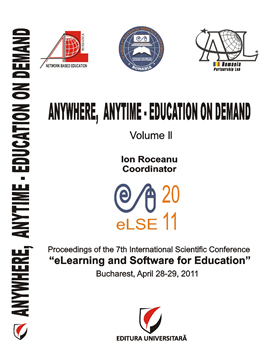ENCOURAGING SOCIETY TOWARDS E-LEARNING
ENCOURAGING SOCIETY TOWARDS E-LEARNING
Author(s): Eid Ayaad Alraddadi, Abdulaziz Alraddadi, Mosleh Hamed AlotaibiSubject(s): Education
Published by: Carol I National Defence University Publishing House
Keywords: E-content; online courses; and society environment; E-learning importance.
Summary/Abstract: Electronic Education (E-Learning) is the art of converting the brainware of the teacher into a courseware to be shared and disseminated via electronic media (K.Durah, 2003)4. It deals not only with obtaining the right information in the right time but also with full understanding and processing of the information in the given context. E-Learning facilitates Distance Learning which is a technology, where the distance between a teacher and a student, or among students, is characterized by the speed of the feedback, i.e. how quickly the student gets the feedback from his teacher – tutor (K.Durah,2003)4. This type of education cannot exist without electronic education. It means providing the students with the content of a course via all electronic media including Internet, intranet and CD-ROMs. The purpose of this study is to motivate the society towards the e-learning by comparing the e-content with traditional course. We face challenges to convince our society to adopt E-learning technologies; such challenges can be overcome by working together, through partnerships of schools with universities, colleges with industry, and merging people with school in e-learning activities, hoping to break down some of the physical and mental barriers that divide the way we work, live and the way we think. Educators can use many ways to produce the motivations and benefits of the e-learning. The institutions have realized that partnership and co-operation are the best way forward, it is important to understand the characteristics of courses that affect students' preferences for either traditional classroom environments or online environments in this paper. This study also explores the characteristics of e-courses that affect students' preferences towards online courses. These results should help in providing guidelines to society considering the benefits of the e-courses.
Journal: Conference proceedings of »eLearning and Software for Education« (eLSE)
- Issue Year: 7/2011
- Issue No: 02
- Page Range: 116-120
- Page Count: 5
- Language: English

